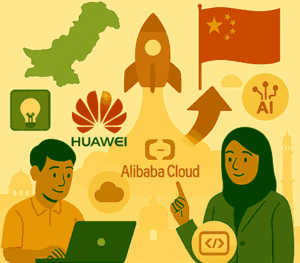Information & Technology
Pakistan
AWS in Pakistan, digital economy Pakistan, foreign investment Pakistan, Google Cloud Pakistan, local tech startups Pakistan, Microsoft exit Pakistan, Microsoft leaves Pakistan, Pakistan business climate, Pakistan IT ecosystem, tech industry challenges Pakistan, Zeeshan Azhar
Zeeshan Azhar
0 Comments
Why Microsoft Left Pakistan, and Who Might Fill the Void

Microsoft’s decision to exit Pakistan after 25 years has sent shockwaves through the country’s technology ecosystem. Once a trusted partner for enterprises, educational institutions, and government projects, Microsoft has now shifted its strategy. Instead of maintaining a direct presence in Pakistan, the company will serve clients through regional hubs and local partners.
While the company cites a global restructuring of its business model, the exit reflects deeper challenges within Pakistan’s business environment. At the same time, it opens the question: who will step in to fill the void?
Why Did Microsoft Leave Pakistan?
1. Economic Instability

Pakistan’s recurring economic crises—currency devaluations, high inflation, and inconsistent policies—have eroded investor confidence. For multinational corporations, sustainability becomes difficult in an unpredictable economy.
2. Regulatory Hurdles

Microsoft faced frequent challenges related to tax policies, licensing restrictions, and red tape. Unlike neighboring markets where digital frameworks are clearer, Pakistan’s policy landscape often remains uncertain and inconsistent.
3. Shifting Global Priorities

Globally, Microsoft is transitioning to a cloud-first, AI-driven model. Rather than maintaining offices in every country, it consolidates operations into regional hubs. Pakistan became one of the casualties of this restructuring.
4. Limited Market Growth

Compared to India or Vietnam, Pakistan’s IT spending and digital adoption remain limited. Enterprises often resist large-scale transformation, while startups rely more on open-source or cost-effective solutions. This limited demand may have made the market less attractive for Microsoft’s premium services.
The Immediate Impact
Loss of Direct Support: Enterprises will now need to rely on regional representatives instead of having a direct Microsoft office to provide training and customer care.
Education Programs in Jeopardy: Microsoft Pakistan was a driving force behind student initiatives and digital literacy programs, which helped thousands of young people. The continuity of these programs remains uncertain.
Investor Sentiment: A tech giant pulling out after 25 years creates a reputational risk for Pakistan. It may discourage other global companies from entering unless reforms are made.
Who Might Fill the Void?
Though Microsoft’s departure is a setback, it also creates opportunities for other players—both global and local.
1. Amazon Web Services (AWS)

AWS already leads the global cloud market and is making inroads in Pakistan. With Microsoft stepping back, AWS could deepen its presence by expanding partnerships with local enterprises and startups.
2. Google Cloud

Google has actively invested in digital skills training across Pakistan. Its cloud division could step in to capture Microsoft’s former enterprise clients, especially in education, healthcare, and fintech.
3. Local Innovators and Startups

Pakistan’s startup ecosystem has grown rapidly over the last decade. Companies focusing on cloud solutions, software development, and AI tools may now have the chance to serve clients who relied heavily on Microsoft. This could accelerate homegrown innovation and reduce dependence on multinationals.
4. Chinese Tech Firms

China’s strong ties with Pakistan could open the door for companies like Huawei Cloud and Alibaba Cloud to strengthen their footprint. These firms already provide competitive cloud and AI services in other emerging markets.
Lessons for Pakistan
Microsoft’s exit must be seen as a wake-up call. Pakistan cannot afford to lose more international tech players. The government, policymakers, and industry leaders need to act decisively:
Simplify regulations to make the market more attractive for investors.
Stabilize the economy to create a predictable environment for businesses.
Encourage digital adoption among enterprises and government bodies to expand the IT market.
Invest in local startups to ensure Pakistan does not remain overly reliant on foreign corporations.
Conclusion
Microsoft’s departure from Pakistan is more than a corporate move; it’s a reflection of the country’s pressing economic and regulatory challenges. Yet, every challenge brings opportunity. AWS, Google, Huawei, Alibaba, and local innovators are all potential contenders to fill the void.
If Pakistan embraces this moment to reform policies, invest in local talent, and welcome new players, the country can turn this setback into a chance for stronger, more self-reliant digital growth.













Post Comment